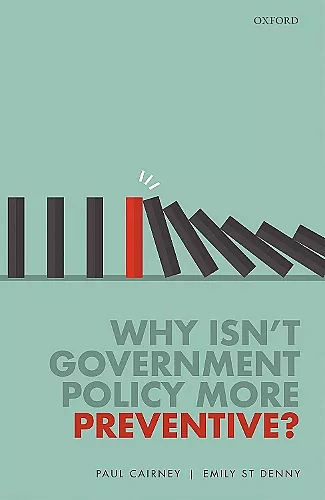Why Isn't Government Policy More Preventive?
Understanding the Gaps in Preventive Government Policy
Paul Cairney author Emily St Denny author
Format:Hardback
Publisher:Oxford University Press
Published:30th Jan '20
Currently unavailable, and unfortunately no date known when it will be back

This insightful book explores the reasons behind the ineffective implementation of preventive policies in government, highlighting significant gaps in understanding and execution.
In Why Isn't Government Policy More Preventive?, the authors delve into the significant disconnect between the objectives outlined by governments and the actual results achieved. Through a systematic blend of theoretical and empirical analysis, this book sheds light on the complexities that hinder effective policymaking. It serves as a cautionary tale against repeating historical mistakes, prompting readers to consider why, despite the adage that 'prevention is better than cure,' policymakers often fail to adopt a preventive approach in their strategies.
The book argues that policymakers are constrained by their ability to address only a fraction of their responsibilities, often operating in an environment that is beyond their comprehension and control. This limited perspective contributes to the gap between the expectations set by policymakers and the real-world outcomes of their initiatives. By examining the rhetoric surrounding prevention in the context of the UK and Scottish governments, the authors reveal that while the concept of prevention appears timely and relevant, its ambiguity prevents governments from translating it into actionable policies.
Why Isn't Government Policy More Preventive? explores the implications of governmental commitments made without a clear understanding of implementation. It compares various policymaking contexts and outcomes across critical areas such as health, justice, and employability, using insights from policy theory to analyze the results. This exploration encourages policymakers to reflect on their approaches and to break the cycle of optimism and despair that often accompanies attempts to tackle complex societal issues.
ISBN: 9780198793298
Dimensions: 231mm x 161mm x 22mm
Weight: 580g
304 pages